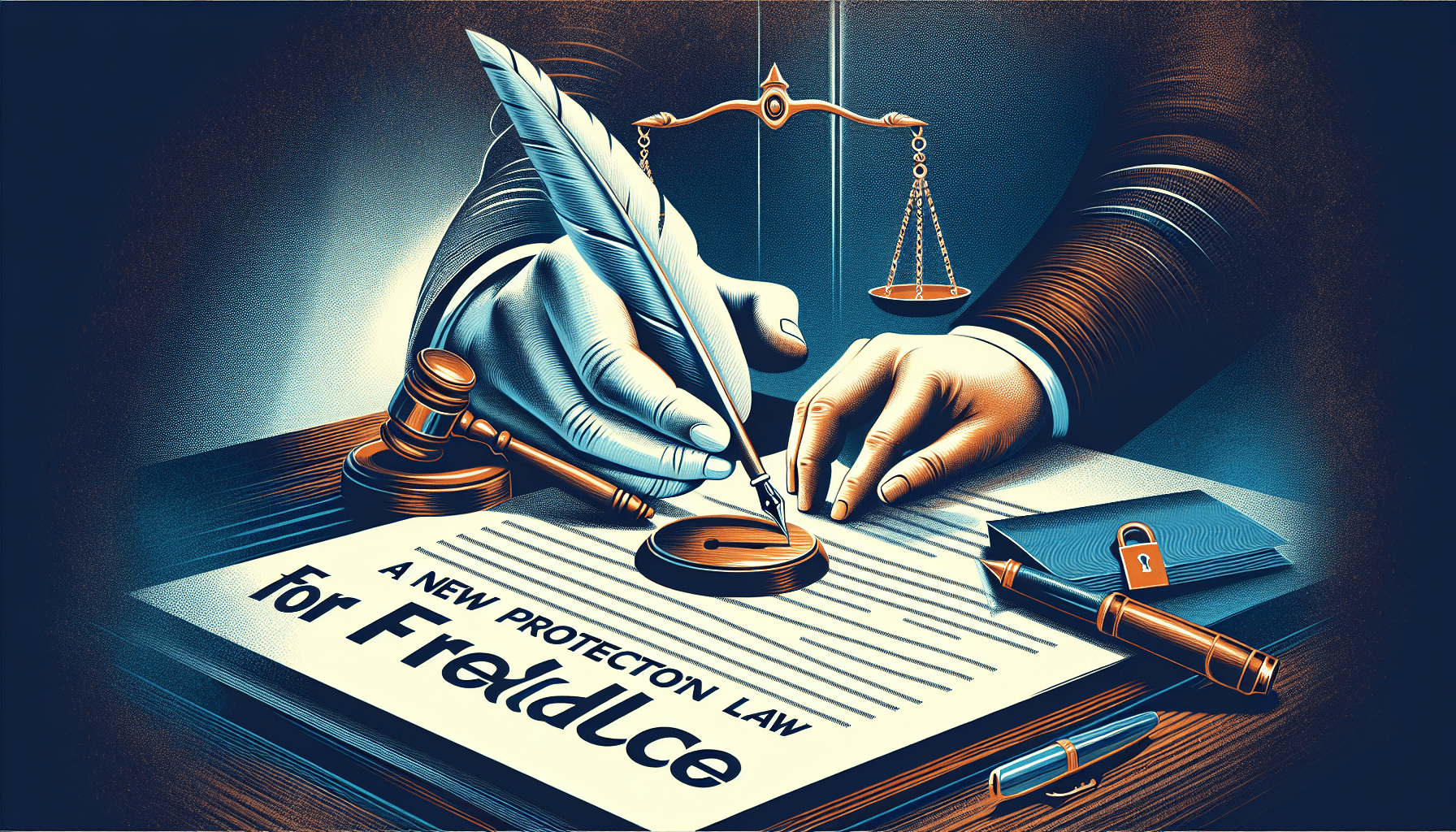In a major move to protect the rights and interests of freelance workers, Governor Kathy Hochul has signed into law new freelancer protections. The law aims to address the growing concerns and challenges faced by the increasing number of freelancers in the workforce. With a record 64 million Americans turning to gig work in 2023 alone, this legislation comes at a crucial time. It is a significant step towards ensuring fair treatment, timely payment, and legal recourse for freelance workers. By signing this bill into law, the government is taking a proactive approach to support the freelance community and recognize its contribution to the economy.
Background Information
Overview of freelance work
Freelance work refers to individuals who work independently and are not committed to a specific employer on a long-term basis. Freelancers typically offer their services to multiple clients, allowing them to have more flexibility and control over their work. They often work in creative industries such as writing, graphic design, and photography, but can also be found in a wide range of other fields.
Growing number of freelancers in the US
In recent years, there has been a significant increase in the number of freelancers in the United States. According to a survey conducted in 2023, a record-breaking 64 million Americans turned to gig work. This surge in freelance workers can be attributed to several factors, including the desire for greater flexibility, the rise of the gig economy, and advancements in technology that make remote work more accessible.
Importance of protecting freelancer rights
With the growing number of freelancers in the US, it becomes essential to protect the rights and interests of these workers. Freelancers often face unique challenges such as nonpayment or late payment for their services, lack of benefits and job security, and potential exploitation. Ensuring that freelancers are treated fairly and have access to legal protections is crucial for creating a supportive and sustainable work environment for this growing segment of the workforce.
Introduction of Gov. Kathy Hochul
Brief introduction of Gov. Kathy Hochul
Kathy Hochul currently serves as the Governor of New York. She assumed office on August 24, 2021, becoming the first female governor of the state. Prior to her gubernatorial term, she served as the Lieutenant Governor of New York and represented the state’s 26th congressional district in the United States House of Representatives. Hochul has been a champion for workers’ rights throughout her career and has actively supported legislation to protect freelancers.
Importance of her role in signing the freelance protections into law
Gov. Kathy Hochul played a critical role in signing the freelance protections into law in New York state. By signing this legislation, she demonstrated her commitment to supporting and advocating for the rights of freelancers. Her actions send a strong message that freelancers deserve to be treated fairly and have access to legal protections. This landmark moment will have a significant impact on the freelance community in New York and sets an important precedent for other states to follow.
Overview of Freelancer Protections
Explanation of what the new law entails
The new law signed by Gov. Kathy Hochul in New York state aims to provide additional protections for freelancers. It establishes stronger regulations and standards to ensure fair and timely payment for freelance work. The law requires written contracts for projects over a certain dollar amount, prohibits employers from requesting unpaid work as a condition of hiring, and establishes a complaint process for nonpayment disputes.
Rights and protections provided for freelancers
The new law offers a range of rights and protections for freelancers. These include the right to written contracts, the right to be paid in a timely manner, and the right to be free from retaliation for asserting their rights. The law also establishes penalties for employers who fail to comply with its provisions, including the payment of damages and attorney’s fees. The goal is to ensure that freelancers are treated fairly and have legal recourse when their rights are violated.
Advantages of the New Law
Improved payment practices for freelancers
One of the key advantages of the new law is its focus on improving payment practices for freelancers. Freelancers often face challenges when it comes to getting paid for their work, with many experiencing nonpayment or late payment from clients. The new law establishes stricter guidelines and requirements for payment, including the requirement for written contracts and the ability to pursue legal action in case of nonpayment. These provisions help to ensure that freelancers receive fair and timely compensation for their services.
Protection against nonpayment or late payment
The new law provides freelancers with stronger protections against nonpayment or late payment for their work. It establishes clear guidelines and deadlines for payment, ensuring that freelancers have a legal recourse if they are not paid on time. This protection is crucial for freelancers who often rely on a steady income from their work and need timely payment to support themselves and their families.
Enforcement mechanisms for freelancer rights
Another advantage of the new law is the establishment of enforcement mechanisms for freelancer rights. Freelancers who face nonpayment or other violations of their rights now have a clear process for filing complaints and seeking legal action. The law creates a complaint system where freelancers can report nonpayment disputes, and it establishes penalties for employers who fail to comply with its provisions. These enforcement mechanisms help to ensure that freelancers are not left powerless in situations where their rights are violated.
Impact on Freelancers
How the new law will benefit freelancers
The new law is expected to have a significant impact on freelancers in New York state, benefiting them in several ways. Firstly, it will provide them with greater financial security by ensuring that they are paid in a timely manner for their work. This will help freelancers to meet their financial obligations and budget effectively. Secondly, the law will create a more equitable work environment for freelancers, protecting them from exploitation and ensuring fair treatment. Finally, the law will enhance the overall reputation and professionalism of the freelance industry by establishing clear standards and regulations.
Ensuring fair and equitable treatment of freelancers
One of the primary goals of the new law is to ensure fair and equitable treatment of freelancers. Freelancers often have less bargaining power than traditional employees, and they can be vulnerable to exploitation or unfair practices. The new law aims to address these issues by establishing clear guidelines and standards for hiring and payment practices. This will help to level the playing field for freelancers and ensure that they are treated with respect and fairness in their work.
Creating a more secure and stable work environment for freelancers
By providing freelancers with greater protections and legal recourse, the new law creates a more secure and stable work environment for freelancers. Freelancers will have more confidence in pursuing their work, knowing that they have legal protections in place. This increased security and stability will attract more individuals to freelance work and contribute to the growth and sustainability of the freelance industry. It will also have a positive impact on the overall economy by supporting the financial well-being of freelancers.
Reactions from Freelancer Community
Positive feedback and support from freelancers
The new law has received positive feedback and strong support from the freelancer community. Freelancers have applauded the legislation for addressing long-standing issues and providing them with the protections they need. Many freelancers have shared their personal stories of nonpayment or late payment and expressed relief that these issues are finally being addressed. The support from the freelancer community demonstrates the importance of the new law in ensuring their well-being and success.
Relief at the improved protections
Freelancers have expressed a sense of relief at the improved protections provided by the new law. The uncertainty and stress associated with nonpayment or late payment can significantly impact freelancers’ livelihoods. The new law brings a sense of security and peace of mind, knowing that they have legal protections in place. Freelancers can now focus on their work without the constant worry of not being paid for their services, allowing them to thrive and grow in their careers.
Increased confidence in pursuing freelance work
The new law has also increased the confidence of freelancers in pursuing their work. Freelancers can now feel more secure in their decision to work independently, knowing that they have legal protections to fall back on. This increased confidence is expected to lead to higher levels of participation in the freelance industry, contributing to its overall growth and success. The new law has empowered freelancers to assert their rights and demand fair treatment, creating a more robust and vibrant freelance community.

Challenges and Criticisms
Potential hurdles in implementing and enforcing the law
While the new law aims to protect freelancer rights, there may be potential hurdles in its implementation and enforcement. One challenge could be ensuring widespread compliance from employers who may be resistant to change or may attempt to find loopholes in the law. Additionally, enforcing the law and resolving nonpayment disputes may require resources and a well-functioning complaint process. These challenges need to be carefully addressed to ensure the effective implementation and enforcement of the law.
Concerns about potential loopholes or exploitation
Critics of the new law have raised concerns about potential loopholes that may allow employers to skirt the legislation and exploit freelancers. It is essential to monitor and address any attempts to circumvent the law’s provisions to ensure that freelancers are truly protected. Additionally, ongoing education and awareness campaigns may be necessary to inform both freelancers and employers about their rights and responsibilities under the new law.
Opposition from certain sectors
Certain sectors may oppose the new law due to concerns about the potential impact on their business practices or costs. It may take time for employers to adjust to the new regulations and standards. It is crucial to engage with stakeholders from these sectors and address their concerns to find a balance that protects freelancer rights while also considering the needs of businesses.
Comparison to Other Freelancer Protections
Comparison to similar laws in other states or countries
The new law in New York state can be compared to similar laws in other states or countries that aim to protect freelancer rights. States like California and New Jersey have implemented their own freelancer protections, providing freelancers with similar rights and recourse for nonpayment disputes. Internationally, countries like the United Kingdom and Canada have also introduced legislation to protect freelancers. Comparing New York’s law to these existing frameworks can provide insights into best practices and potential areas for improvement.
Analysis of the strengths and weaknesses of the new law
It is important to conduct a thorough analysis of the strengths and weaknesses of the new law in New York state. Evaluating the effectiveness of the law in achieving its objectives can help identify areas for improvement and potential amendments. This analysis can also inform future policymaking and provide valuable lessons for other states or countries considering similar legislation.

Future Implications
Potential impact on freelance industry
The new law in New York state has the potential to significantly impact the freelance industry. By providing freelancers with stronger protections and legal recourse, the law promotes a more supportive and secure work environment. This increased security is expected to attract more individuals to freelance work, leading to the growth and expansion of the freelance industry. The industry may also become more professional and reputable as a result of the improved regulations and standards.
Expectations for increased freelancer participation
With the enhanced protections provided by the new law, it is expected that more individuals will choose to participate in freelance work. The increased confidence and security provided by the law may encourage individuals to pursue freelance careers, contributing to the growth and diversity of the freelance workforce. This increased participation can lead to a more vibrant and dynamic freelance community, benefiting both freelancers and the economy as a whole.
Possible adoption of similar laws in other states
The success of the new law in New York state may inspire other states to adopt similar legislation. As awareness of the challenges faced by freelancers grows, policymakers in other states may recognize the importance of providing legal protections for freelancers. The success of the legislation in New York can serve as a model for other states to follow, leading to a nationwide movement to protect and support freelancers.
Conclusion
Summary of the significance of Gov. Kathy Hochul signing the freelancer protections into law
The signing of the freelancer protections into law by Gov. Kathy Hochul is a significant milestone for the freelance community in New York state. The law provides freelancers with improved rights and protections, including stricter guidelines for payment practices and recourse for nonpayment disputes. This legislation demonstrates the commitment of the state’s leadership to support and advocate for the rights of freelancers.
Final thoughts on the future of freelance work
The future of freelance work looks promising, with increased protections and support for freelancers. The new law in New York state sets a precedent for other states to follow, signaling a shift towards more equitable and fair treatment of freelancers. As the freelance industry continues to grow and evolve, it is crucial to prioritize the rights and well-being of freelancers, ensuring that they can thrive in their careers and contribute to the overall economy. With the continued support of policymakers, freelancers can look forward to a brighter future and a more secure and stable work environment.




